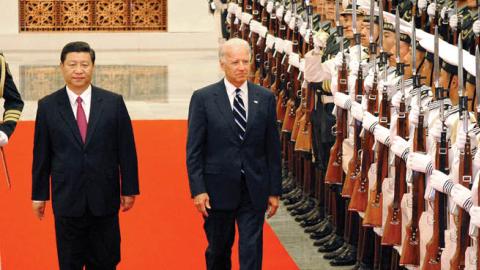In 1936, Germany’s Deputy Fuhrer Rudolph Hess asked British Lord Castlereagh, “Why do you not have Winston Churchill in your British Cabinet? Then we should know you meant business.”
The question was largely rhetorical. Churchill had been a lonely voice in the political wilderness for many years, his warnings about the Nazi menace falling on deaf ears. Today, as America faces an increasingly dangerous and aggressive Chinese Communist Party (CPP), one wonders whether they have any reason to know that President Biden means business. Actions taken in the administration’s first hundred days point in the opposite direction.
Biden has ordered a full withdrawal of American forces from Afghanistan. He is seeking to re-enter the Iran nuclear deal, which would remove the sanctions that have crippled Iran’s economy. He did not respond to Ukraine’s request for assistance when Russia amassed thousands of troops on its border before pulling them back. He has presided over the largest influx of illegal migrants crossing the U.S. southern border in 15 years. And his budget proposes substantially reduced military spending.
One can make a case for some of those decisions. The already diminished U.S. troop presence in Afghanistan has uncertain value today. There is undoubtedly wasteful spending in the Pentagon budget. But as internationalists are fond of pointing out, the world is highly interconnected. What happens in Afghanistan, Iran, Ukraine, the Mexican border, or even the U.S. defense budget, can have a profound impact in the eyes of adversaries, just as the composition of the British Cabinet did in the view of the Nazis.
Biden partly justified his decision to leave Afghanistan on the grounds of freeing the military’s attention and resources for more important conflicts — presumably China. Absent any moves against China, however, it is unlikely the leaders in Beijing will view it that way as the Taliban triumphantly return to power.
Administration defenders might claim the recent sanctions imposed on Russia and expulsion of 10 of their diplomats signal that Biden means business. But what sort of business would that be? For months, Biden described Russian cyberattacks, election meddling and other misdeeds in catastrophic terms. He referred to the cyberattacks as “among the greatest threats to our global security in the 21st century.” Yet in announcing the sanctions, Biden went out of his way to describe his response as “proportionate.” If he considers a few largely symbolic sanctions and expulsions “proportionate” to the crimes he described, then the signal sent is one of weakness, not strength.
China is where all this matters most. Whether the CCP leadership thinks America means business is central to deterrence, and deterrence keeps the peace.
Today’s China is a rival unlike any America has faced. Its economic power and potential vastly exceed that of Nazi Germany and Soviet Russia. Its violent domestic policies and aggressive nationalism has begun to rival those earlier totalitarian foes. It is committing genocide against millions of its own ethnic minority citizens. It has swallowed the democratic bastion of Hong Kong.
Notably, China destroyed Hong Kong’s freedoms knowing full well that doing so would bring an economic setback. It was willing to take that financial hit to promote its larger nationalistic ambitions. Genocide and economic self-sacrifice in the cause of strengthening the regime are powerful evidence of China’s intentions.
Many believe China’s next target is Taiwan. China’s communist leaders are unmistakable in their expressed intention to “unify” with democratic Taiwan. Chinese military exercises over and around Taiwan have increased in frequency and aggression. What’s to stop the destroyers of Xinjiang and Hong Kong from moving next on Taiwan?
For decades, the answer has been American deterrence. America’s military presence throughout Asia, including the Navy’s Seventh Fleet patrolling the Taiwan Strait, has been highly effective. The U.S. is not bound by treaty to go to war to defend Taiwan, as it is for Japan, South Korea and the Philippines. Nonetheless, Chinese leaders have long had reason to believe there was a meaningful chance it would do so. American management of multiple crises in the Taiwan Strait since the 1950s reinforced that belief. China concluded it was not a risk worth taking. Does it still think that today?
Former President Trump’s actions toward China were more confrontational than the Chinese leaders were used to. As significantly, Trump’s actions elsewhere, including the destruction of ISIS and the killing of Iran’s top general, signaled to China that he was not to be trifled with. Deterrence was enhanced.
Biden’s initial foreign policy and security decisions undermine deterrence. They might make China’s leaders think they could capture Taiwan without much American resistance other than post-action sanctions they could easily live with. The president should consider the picture he has painted in his first 100 days and adjust accordingly, or risk finding out who really means business.
Read in The Hill



















